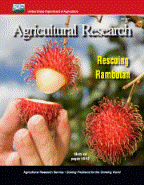United States Department of Agriculture: Agricultural Research Service, Lincoln, Nebraska

Agricultural Research Magazine
Date of this Version
4-2013
Document Type
Article
Citation
Agricultural Research April 2013.
Abstract
The house fly is often considered merely a nuisance. But these flies are capable of transmitting animal and human pathogens that can lead to foodborne diseases, including Escherichia coli, Salmonella, and Shigella bacteria.
Insecticides are important for control, but house flies are particularly good at developing resistance, and their larvae tend to stay deep enough within their gooey food to avoid exposure to sprays.
Scientists at the Agricultural Research Service’s Center for Medical, Agricultural, and Veterinary Entomology (CMAVE) in Gainesville, Florida, are looking at new methods that target adult flies. A promising biological control agent—salivary gland hypertrophy virus (SGHV)—was recently discovered. Once infected with the virus, female flies do not produce eggs, and male flies do not mate.
Entomologist Chris Geden in the Mosquito and Fly Research Unit at CMAVE partnered with scientists at the University of Florida (UF) and Aarhus University in Denmark to study the distribution and host range of the virus as well as the effectiveness of different application methods.
Included in
Agriculture Commons, Animal Sciences Commons, Food Science Commons, Plant Sciences Commons

